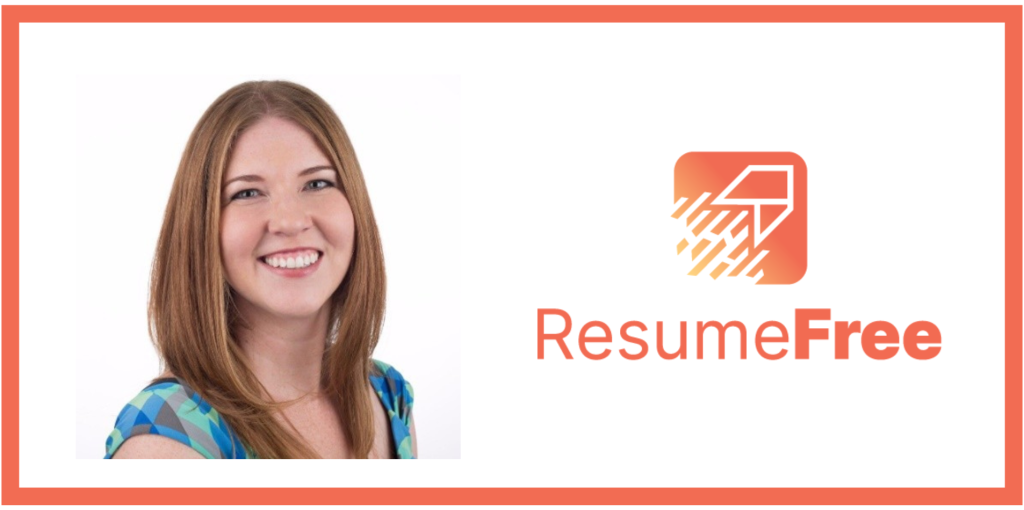ResumeFree™ took a moment to catch Allie, the Founder & CEO of the company, on a Zoom call to get to know her a bit. Click the video below to watch or read the transcript.
I’m Allie Knull. I’m the founder and CEO of ResumeFree. I have been an entrepreneur for five-plus years now. And I kind of identify as human, she/her, ginger, wife, mother, CEO, in that order. So depending on how I’m identifying is where my passion lies.
Can you tell me a bit about where the entrepreneurial spirit all started?
Yeah. So a little bit of nature, a little bit of nurture, I would have to say. So I actually just was thinking about this as it was Father’s Day recently. My dad was actually the first entrepreneur that I knew, and he had a business where he was very much responsible from A to Z when it came to everything. So there was always that kind of lens through that I saw things from a different perspective. And then just kind of, it happened one day that I didn’t have a job when I was about to go on maternity leave. And so, I always talk about this, where I had a conversation with my partner saying, listen, I think I have a very unique set of skills, ala Liam Neeson.
And I think that people would be quite interested to have my unique set of skills, and help them build their businesses. And so looking around my sphere of influence, all of a sudden I had all these other entrepreneurs there. And I said, hey, if I was to help you build your team, would you let me? And they go yeah, we’d pay you. So it kind of evolved from there where halfway through my maternity leave, I was starting to incorporate and get into doing the small business thing myself. And then it kind of snowballed beyond my capacities.
So was that the catalyst for River City HR, then?
Yeah. So that was the catalyst for River City, which is the launching point I would say for ResumeFree. So River City was more of a management consulting firm that was helping small businesses, startups, scale-up, and nonprofits work on their talent management, and then looking deeper into some of the needs of those specific organizations. ResumeFree, kind of came to fruition with a big, what if statement. And the big, “what if” statement had been looming for a while. And it was always about what if there was a better way to hire people without a resume.
So from that perspective what happened was going to market and seeing really what was the threshold I would say of what people were willing to and not willing to do when it came to hiring. And a lot of times it was they’re not willing to spend a lot of time going into the applications, but they’re willing to have deeper conversations with a lot of people that they know more information about. The crappy thing about that is that most of the time, those decisions on who they talked to versus who they were screening were based on that resume. And it would be the indicator or the one thing that would pass or fail a candidate. And so I thought if there was a way to bring technology into this, where we could gather all the data that the candidate gives us, and we could gather all information about what their potential could be, how much would people pay for that? Turns out the answer came quite quickly.
So it was trying to find a way to make a process where we could have people get connected based on what the potential of the person in the role would look like versus what experience they had or brought to the table because I’m sure all of our first jobs were kind of thanks for taking a chance on me, appreciate it. Right? And then taking a look at the background of people, not everybody has higher education. Not everybody had the opportunities for co-ops. Not everybody has lived in the same city where all of their community has been for their entire life, right? So there are many different factors that affect somebody’s ability to look good on paper. And that shouldn’t be an indicator of whether or not we have a conversation with them.
Diversity is an important component of what makes ResumeFree. Tell me how going ResumeFree helps eliminate biases.
So I think to kind of go into that, we need to back up a little bit and say there are so many different biases. There are actually over 174 cognitive biases that we just as human beings on a day-to-day basis are trying to work through. And so biases kind of sneak in when we don’t have enough information, when we need to make a quick decision when we’re trying to compare a whole bunch of information very fast, or if we are just trying to gather from nothing, if there’s no information, that’s really giving us anything. So when you factor in all of those different areas, it kind of comes down to recruitment. Here’s somebody I don’t know. I need to make a decision really quickly. Sometimes I have too much information, and sometimes I don’t have enough information. And so from that perspective, when you try and get rid of the biases, it’s how are we doing this to make it as objective as possible?
And when you think of traditional recruitment, it’s usually, there’s the gatekeeper that’s, I decide who comes in and who goes. And quite honestly, I had that mentality myself as a professional recruiter that has worked for some very, very large companies across Canada. And I know who’s the best person to hire, but then my science brain goes, well, what does that mean? How do I know what makes me different from somebody else? So I wanted to back up a little bit and say, okay, what are the necessary evil questions that we need to ask? And so those evil questions are, do you have permission to work in the country where the work is being done? And that’s a legal question that everybody needs to abide by. So that honestly is the only pass-fail or yes-no question that we have within resume free.
Everything else is, tell me a little bit more. What’s the highest level of education? What’s your salary band? Where are you willing to do the work from? Tell me about some of the communication. What software do you use? What languages do you use? And so going into those requirements or need to-haves on the job, but getting that information up front and then putting it into a large spreadsheet where everything is there. So now we’re getting rid of, do you have the two to five years experience? Do you have a master of science in this? That being said, if education is a bonafide occupational requirement for the job, we will still put that in. I don’t want a doctor that’s never been to med school.
That makes sense.
Yeah. So one other thing that we do is we can actually remove the name, and we can remove the email address or any kind of identifiers for these individuals and just show their responses.
And so now you have very clean data that’s presented that shows here are what they bring to the table. And then on the other side of it, we have a behavioural assessment that actually has a reliability and validity factor. So a lot of people think when they hear assessment, they think personality assessment, and here’s where I’m going to be like these four letters or this colour or this Disney princess, whatever it might be, those assessments are not normative. They’re ipsative. And those don’t have any value when it comes to hiring or what the potential of somebody is. Whereas, a normative assessment is one that is based on science. It has years and years of research on it. It’s been tested against adverse impact bias, which those other ones don’t pass those tests. So when it comes to race, gender, age, or any of those types of factors, they’ve already been validated based on the normative assessments.
So from a scientific perspective, there is an actual scientific method attached to those assessments versus the others, which you fill out on Buzzfeed, right? So with that being said, we’re able to determine what best traits come from these individuals, and what their top strengths are for the role. And that makes us a differentiator, because now we’ve got all this data about what they have kind of as a background, but then also what their potential could be without describing how many years where they got their education from, all of those things. Plus here’s what their potential could look like. And with those two factors combined, we actually have a really high retention rate at two-plus years, almost three years now. It’s 97%.
Tell me a bit about some of the results that you’re getting for some of your clients that you’re currently working with.
Yeah. So we have a whole bunch of different styles of clients. We’ve got not-for-profit foundations, we’ve got professional services, we’ve got tech scale-ups, we’ve got IT companies. And a lot of the different results that we’re getting are actually all the same. It’s we have added in the second person into the organization, or we’ve added in the first person to a new team, and they’re fitting in so well that they’re now able to grow their team. One of the fastest offers that went out was after three days of using our tool from the start. So we work a heck of a lot faster than a lot of the other tools out there. And then because of the data that we’re able to provide, so not only the background but the potential, we have very specialized reports that can show what motivates that employee. Which is how it gets us into that 97% retention because the employers now don’t have to guess what’s going to be important for having that conversation with the individual.
Do they want accolades or do they want recognition, which is two different things? But it depends on what that individual’s looking for. So we’ve seen one company grow their team to, I think they’re at 10 or 11 people already, which is fantastic. And have their entire team have gone through our system. We’ve seen departments grow. We’ve seen offices open up, and we’ve seen second into the organizations. And honestly, I’m most proud of those ones because it takes a lot for somebody to go from solopreneur into here’s my business. Right?
You talk about the screening questions. Do you have different screening questions for different roles that businesses are hiring for?
Absolutely. Yeah, so far be it from me to keep the standard-issue questions all the way through. We do have our baseline that we would ask, again, the salary, location, can you work where the job is, if not. And then we can go into deeper discovery as it were with the type of individual that they need for the role, that ideal candidate profile, but also what are those requirements of the job? What are the outcomes that they’re going to have when they do fill that role? And can these individuals reach those outcomes? So our trade secrets are actually underneath how we create that ideal candidate profile, as well as those questions whilst not overwhelming the candidates because we don’t want them to be an hour and a half on the computer. All in all, it takes about 30, 35 minutes.
There are some legal considerations when posting jobs. Can you discuss what those are?
So from a legal perspective, we need to make sure that number one, privacy, when it comes to any software as a service, we adhere to the highest level of privacy that is out there, presently. Number two, for hiring, we need to make sure that we’re asking questions that are bonafide occupational requirements and or have a way to be valid against the data that it’s receiving. So again, the legal question is, are you able to work in the country where the work is being done? If people do not answer that question with, yes, I do have that, they are automatically moved out of the running for it because a lot of the people that we work with don’t have the capacity to bring in foreign verified backgrounds or foreign verified professionals, unfortunately. But that’s not to say that there could be other opportunities out there for them. Again, from the validity and reliability, we need to make sure that we’re that testing or using assessments that don’t exclude anybody, and ours doesn’t. It just shows what their potential could be.
In which case, there’s ones that could potentially get bumped out if they don’t meet a minimum. Ours has a deception algorithm, which is another way that people get bumped out. So if they’re trying to fudge the system, then the deception algorithm will actually prevent them from moving forward because they’re not giving reliable data. And from that perspective, we usually have maybe one or two individuals that don’t make it past that just because they think that they’re able to. But from a legal ramification, we need to show that each one of these candidates has shown their top answers, and we’ve selected our candidate or the hiring manager has selected their candidate based on the data, not based on age, race, background, any of the protected grounds. And so our data provide that because we can show that the data has been objectively presented and through multiple measures against any type of bias or favouritism as it were. So we actually hit harder on the legal side of things than what a traditional recruitment process would be. We can back it up with data, whereas traditional recruitment cannot.
What are some things employers need to remember when recruiting for a role at their company?
When it comes to recruiting at their company, there needs to be diversity of thought as well as the diversity of skill. And so usually that means somebody that doesn’t look exactly like you do, and doesn’t think exactly like you do and comes from a completely different background than you do. And a lot of times that’s unfamiliar and scary, and people don’t want to do it. But the sooner that you can add in different thought leaders into your organization, or even just taking the EOS, the entrepreneur operating system viewpoint of it, you’ve got your innovator, you’ve got your implementer. And now you need to build underneath that. There needs to be a dichotomy, again, of individuals, people that do and people that think. And they all need to be different because when you bring a whole bunch of skills to the table, you’re going to go faster.
You’re going to go farther, you’re going to make more money. And it’s been proven that there’s a higher production or performance value of more diverse teams. So I think it’s one thing to challenge employers to say like think outside the box when it comes to it, but also create those opportunities to meet people that think outside the box because we always blinders, we get stuck in our own little rut, hey, I’m in the tech space. I’m going to stay in the tech space or, hey, I’m in marketing, I’m going to stay in marketing. But when you start to meet more people that can add value to your team, it’s okay, I enjoy this person, but how can they add value or how can I create this ideal candidate profile based on what this person has done? And if they won’t come work for you, you can always create something that would be available for somebody else to come work. Right. That’s the other thing too. You don’t necessarily have to go after all of the what people call gold stars or rock stars or whatever it is.
But as long as you can identify what those, amazing traits are that individual has, you can create something that brings that type of person to your table. But I think it’s important to always think of, are we just adding in a bum in a chair or are we adding value to the team? And never about like, do they fit in? It’s what is their culture add? What is their value add to our organization?
How has ResumeFree evolved?
It has been through so many iterations. Basically, the idea first started thinking that it would be like eHarmony for employers and candidates where they would just match on everything that they think they would. And that kind of shows my vintage number one. So that shows how long I’ve been married to my partner. But from that perspective, I think it’s, I had this great idea to have both candidates and employers coming together and making it happen like that. We were going to give a top 20 anonymized list, and then give the top five to the employers. And then, from the rafters, our clients, they were screaming at us saying we want transparency. And so rather than showing our whole trade secret on it, we just said, okay, let’s show you everybody that comes through.
And then you can make that decision. So we went from having a dual-sided marketplace, working with the candidates and working with the employers and then into our platform, and then trying to push out from there. We were doing the posting and everything like that and found out that’s not what they wanted. Our customers did not want that. Our clients did not want that. So we backed it out. And right now we’re truly a screening as a service, whereas, before we were a platform. So screening as a service is basically we work with our employers to get that ideal candidate profile. We create that profile within half a day or less. That profile is up and ready to go for the candidates to be screened the next day. And so we can move much faster. We can get candidates through much quicker, but we don’t own where they’re sourced from.
We don’t own how we put how many people are in there. That’s on the employer because it’s a candidate marketplace out there right now. We want them to align correctly with the organizations they want to work for. And then from there, we can process real-time how many candidates go through. The data is updated immediately. They can see exactly who’s going through and how they’re ranking themselves against everybody else. So we went from having a process that was time driven, that was us driven, that was behind the scenes to a fully transparent model, besides the trade secrets, that’s still kind of kept under wraps. But we have this transparent model where our clients are thanking us for how many candidates and what about this? And we’re able to respond immediately. Oh, well, this person had this issue over here, or they hit the deception algorithm twice. We’ll send it through again, just to make sure. We have the opportunity to show we can do this much faster with more data, and you can make a better-informed decision. And it’s magic.
What are three things that you’re most grateful for?
Ooh, most grateful for, family first and foremost. I am very grateful for my family, and I know not everybody is as lucky as I am to have a beautiful family and a supportive one as well. My health, because it’s been a wild ride the last year. And I would have to say the third one would be like the greater community. I always was just kind of going along with the corporate world. But since I stepped into the innovation sector as an entrepreneur, I’ve really found a lot of very supportive advisors and mentors and colleagues and peers and people just jumping into it. And I feel blessed just to be part of it.




